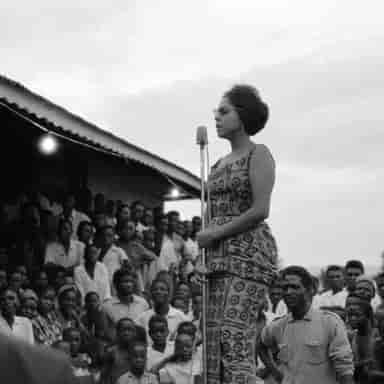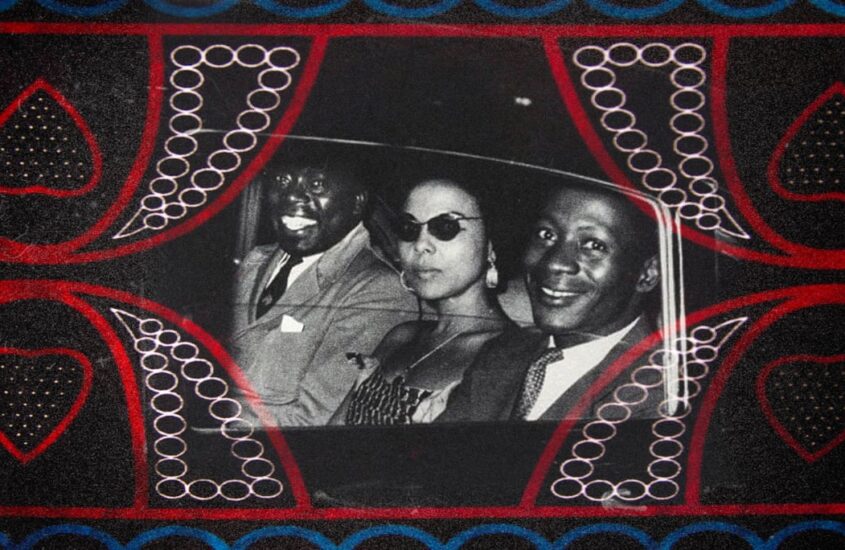
Andrée Blouin transformed African politics during the turbulent 1960s independence movements, yet few know her extraordinary story. From her humble beginnings in colonial Central Africa to becoming a key architect of Pan-African liberation, Blouin broke barriers and challenged both colonial powers and traditional gender roles.
Early Life and Rising Political Consciousness
Born in 1921 in Bessou, Oubangui-Chari (modern-day Central African Republic), Blouin faced immediate discrimination as a mixed-race child. The French colonial authorities forcibly separated her from her mother at age three, sending her to a distant Catholic orphanage. This early trauma ignited her lifelong fight against colonialism and racial injustice.
Blouin escaped the orphanage at age 15 and made her way to Brazzaville. There, she witnessed firsthand how the colonial system oppressed African peoples. She began organizing women’s groups and advocating for civil rights, quickly developing a reputation as a fearless activist.
Shaping Congo’s Independence
In 1960, Blouin emerged as a powerful force in the Congo Crisis. Prime Minister Patrice Lumumba appointed her as his chief of protocol and advisor – making her the highest-ranking woman in the new government. She skillfully navigated diplomatic relations while pushing for true independence from Belgian influence.
Blouin’s strategic abilities shone during international negotiations. She represented Congo at crucial meetings with the UN and world leaders, advocating for:
- Complete political independence
- Economic sovereignty
- Pan-African unity
- Women’s participation in governance
Beyond Congo: Pan-African Vision
Blouin’s influence extended far beyond Congo’s borders. She worked closely with independence leaders across Africa, including:
- Sékou Touré of Guinea
- Kwame Nkrumah of Ghana
- Ahmed Ben Bella of Algeria
Her memoir “My Country Africa: Autobiography of the Black Pasionaria” captures her vision of a united, independent Africa free from colonial control.
Legacy and Continued Relevance
Blouin’s work laid crucial groundwork for:
- African women’s political participation
- Pan-African cooperation
- Anti-colonial resistance strategies
- Progressive governance models
Modern African democracy movements continue to draw inspiration from her example of fearless advocacy and strategic leadership.
Fighting Historical Erasure
Despite her pivotal role, many histories of African independence overlook Blouin’s contributions. This erasure reflects broader patterns of minimizing women’s roles in liberation movements. Recent scholarship has begun to rectify this oversight, recognizing Blouin as a key architect of African independence.
Impact on Modern Africa
Blouin’s ideas remain relevant to contemporary African politics:
- Her emphasis on economic independence foresaw current debates about neo-colonialism
- Her advocacy for women’s leadership helped pave the way for modern female African politicians
- Her Pan-African vision influences current continental cooperation efforts
Personal Cost of Activism
Blouin paid a heavy price for her activism. She faced:
- Multiple assassination attempts
- Forced exile
- Separation from family
- Constant surveillance Yet she never wavered in her commitment to African liberation.
Educational and Social Legacy
Today, Blouin’s legacy lives on through:
- Academic studies of her political theories
- Women’s leadership programs inspired by her example
- Cultural works celebrating her contributions
- Grassroots movements following her organizational models
Conclusion
Andrée Blouin’s life demonstrates how one person’s courage and conviction can reshape history. Her work during Africa’s independence movements created lasting change that continues to influence politics today. As new generations discover her story, Blouin’s legacy inspires fresh waves of activism and leadership across Africa and beyond.
Keywords: Andrée Blouin, African independence, Congo Crisis, Pan-African movement, women leaders Africa, colonial resistance, African politics, Patrice Lumumba, African women’s rights, African liberation movement
Note: This article uses verified historical sources but encourages readers to explore additional academic works about Blouin’s life and impact.









